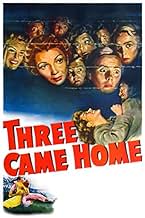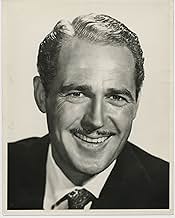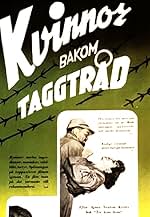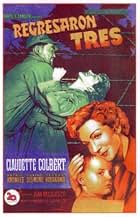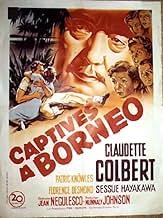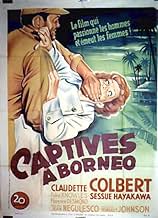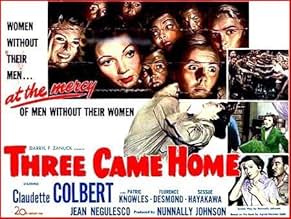Agrega una trama en tu idiomaDuring Word War II, American author Agnes Newton Keith is imprisoned by the Japanese in various POW camps in North Borneo and Sarawak.During Word War II, American author Agnes Newton Keith is imprisoned by the Japanese in various POW camps in North Borneo and Sarawak.During Word War II, American author Agnes Newton Keith is imprisoned by the Japanese in various POW camps in North Borneo and Sarawak.
- Dirección
- Guionistas
- Elenco
- Premios
- 3 premios ganados y 1 nominación en total
- Elderly Resident
- (sin créditos)
- English Girl
- (sin créditos)
- English Radio Announcer
- (sin créditos)
- English Radio Announcer
- (sin créditos)
- Japanese Soldier
- (sin créditos)
- Woman Prisoner
- (sin créditos)
- Englishman
- (sin créditos)
- Dr. Bandy
- (sin créditos)
- Japanese Soldier
- (sin créditos)
- Dirección
- Guionistas
- Todo el elenco y el equipo
- Producción, taquilla y más en IMDbPro
Opiniones destacadas
We know from Sessue Hayakawa's cultivated Japanese colonel that Hollywood is changing its perceptions of our former enemy. Cruel stereotypes do continue (presumably based on fact), but the colonel's character is humanized to an unusually sympathetic degree-- even his loss in the recent atomic bombing of Hiroshima is mentioned. Then too, it's well to remember that during the war our government interned US citizens of Japanese extraction in pretty inhospitable camps along the eastern Sierras, and probably illegally so.
Anyway, the movie has the look and feel of the real thing, while the producers should be saluted for using as many actual locations as possible. The fidelity shows. Since the story is the thing, the cast appropriately has no stars except for Colbert, which helps produce the realistic effect. There are a number of riveting and well-staged scenes. But the staging of the final crowd re-union scene strikes me as particularly well done. And, of course, there's that final heart-breaking view of the hilltop that still moves me, even 60 years later. All in all, this is the old Hollywood system at its sincere and de-glamorized best.
Several reviewers wrote a fairly common remark, especially about black-and-white pictures, in these forums: that this film is "surprisingly good" or "good for its time period." Let's take that idea to its logical conclusion. Was King Lear "good for 1606"? Was Mozart's Requiem "good for 1701"? Are Citizen Kane and The Maltese Falcon "good for 1942"?
No. All ages produce masterpieces as well as plenty of popular entertainments. 1950 had Ozzie & Harriet, but it also delivered All About Eve, The Third Man, Rashomon, and this film. The unfortunate truth is, many people believe that any outstanding work of art that preceded their generation is "surprising."
But I rush to add that indeed there was something different fifty years ago, not surprising, but important: Filmmakers showed restraint. Though it is about war, "Three Came Home" generates emotional power with very little staged brutality. There's more carnage in 7 seconds of "Se7en" than in the whole of this war film. Consider: Although it is brief and entirely bloodless, the scene where Claudette Colbert is tortured is almost unbearable.
But the greatest strength of this film is its fairness. Although all the brutality is perpetrated by the Japanese occupiers, they aren't villains. We come to respect the colonel played by the magnificent Sessue Hayakawa. In fact, when his character talks about his son's death at home-- and then says it happened at Hiroshima — it's another breathtakingly powerful moment, and our sympathy is immediately with him. As Colbert's character says to him, "Whatever the rest is, there's no difference in our hearts about our children."
In THREE CAME HOME she plays Agnes Keith, an American author married to a British colonial officer (Patrick Knowles) living in Borneo. When the Japanese invade the island they imprison the American and British residents. The Keiths are interned in separate jungle camps one for women and children and another for men for three and a half grueling years. It is true that at times Colbert doesn't quite look like a prison camp starveling but in those days movies did not offer the sort of hyperrealism we've grown accustomed to since the 60's, but she certainly does not look like she stepped out of a beauty salon. In fact I can think of no other film in which she appeared more plain and unvarnished. Few if any actresses of her stature in that era would have taken on the physical demands of this role. Unfortunately it was also her final socko performance on film. None of her 50's work came close to her substantial work here and she was all but wasted in PARRISH (1961). But here both she and Sessue Hayakawa as the prison camp commander deliver true and memorable performances as mortal enemies whose mutual interest in literature and shared experience of parenthood create a tenuous bond that augments the suspense and dramatic impact of the story.
Based on a memoir by the real-life Mrs. Keith (who was quite a character in her own right, and not remotely like Colbert), there is a vein of intelligence running through the proceedings, lifting them out of the mainstream of the often jingoistic wartime prison film genre. The Japanese are depicted in a dignified and fair manner without being whitewashed; in fact, in an early scene Hayakawa praises Mrs. Keith for the balanced views in her book about the Orient which he had read before the war. It is precisely his respect for her broadminded attitude that probably saved her life. Nunnally Johnson's script is tight and focused, as is the whole enterprise. The emphasis is on human relationships, so that by the end we are swept up in the emotional life of the characters. A bright note is the casting of a winning boy actor named Mark Keuning who has to be one of the best and most believable child actors ever. He appeared in only two movies, both in 1950, before retreating permanently from films.
This is a film worth seeing again and again. It has lost none of its essential power over the decades. Other films are grittier, with more blood and pus and exaggerated savagery, more breathtaking location shooting and exotic cultural immersion, but few can pack the kind of punch this one does. The ending is one of the most moving you will ever see.
¿Sabías que…?
- TriviaAgnes Newton Keith, the writer of the book on which this film was based, wrote a letter about the film and its critical response. The letter was published in 'The New York Times' on 26 March 1950. It reads: "...I find that one or two critics (not 'The New York Times') question why the story was written....I wrote 'Three Came Home' for three reasons: For horror of war. I want others to shudder with me at it. For affection of my husband. When war nearly killed me, knowledge of our love kept me alive. And for a reminder to my son. I fought one war for him in prison camp. He survives because of me....The Japanese in 'Three Came Home' are as war made them, not as God did, and the same is true of the rest of us."
- ErroresColonel Suga says he attended the University of Washington for four years and Agnes reveals that she attended Berkeley. Suga goes on to say that Cal "murdered" Washington's football team. However, Tatsugi Suga arrived at Washington in 1924 and during the next four seasons California never defeated Washington. Only one football game would fit Suga's description: a 33-0 loss in 1933.
- Citas
[first lines]
Agnes Newton Keith: Six-degrees north of the Equator, in the heart of the East Indies, lies Sandakan, the tiny capital of British North Borneo. In Sandakan in 1941, there were 15 thousand Asiatics, 79 Europeans, and 1 American. I was the American. My name is Agnes Keith. I was born in Oak Park, Illinois, and graduated from the University of California at Berkeley. My husband is Harry Keith, a colonial official of British North Borneo. Borneo became my home when Harry and I were married. And it was in Sandakan that I bore one child, and lost another. And it was in Sandakan that we waited - 45 white men, 24 wives, and 11 children - through the anxious days of 1940 and '41. Certain only of one thing: that sooner or later, Japanese guns would join in the thunders of war, and Japanese troops would come down through the East Indies. The men waited because it was their duty; the women because it was their choice.
- ConexionesEdited into Your Afternoon Movie: Three Came Home (2023)
- Bandas sonorasYou Say the Sweetest Things (Baby)
(uncredited)
Music by Harry Warren
Played on the radio before and after the news flash regarding Pearl Harbor
Selecciones populares
- How long is Three Came Home?Con tecnología de Alexa
Detalles
Taquilla
- Total en EE. UU. y Canadá
- USD 1,900,000
- Tiempo de ejecución1 hora 46 minutos
- Color
- Relación de aspecto
- 1.37 : 1
Contribuir a esta página


